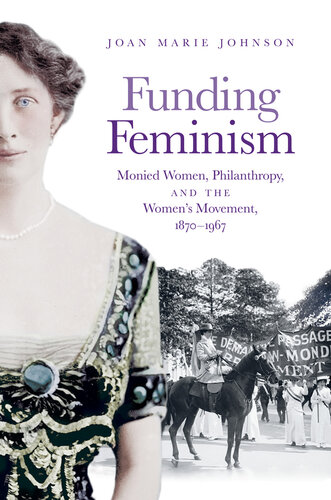
Funding Feminism
Monied Women, Philanthropy, and the Women's Movement, 1870–1967
- اطلاعات
- نقد و بررسی
- دیدگاه کاربران
نقد و بررسی

Starred review from August 1, 2017
Historian Johnson's (Northwestern Univ.) first book examines the role that wealthy white women have played in advancing women's rights through financial support for feminist causes. Across seven thematic, roughly chronological chapters, the author examines a century of female philanthropy in the areas of suffrage, labor, education, and birth control, persuasively arguing that donors with deep pockets persistently shaped the priorities and successes of organized feminism. Women such as Alva Belmont, Katherine McCormick, Mary Garrett, and Grace Dodge funded office space and paid positions in the suffrage movement, established working women's clubs, built living quarters for female students, and funded decades of research that brought us the birth control pill. Throughout, Johnson highlights the uneasy reality that such contributions--often crucial to movement successes--gave these women disproportionate influence among activists who were fighting for greater equality. Thus, feminist philanthropists often became controversial figures within the movement they helped to support. VERDICT This compelling work of original and much-needed research with be of interest not only to those who study the history of feminist activism but to those with an interest in the power that private money wields in social justice circles.--Anna J. Clutterbuck-Cook, Massachusetts Historical Soc.
Copyright 2017 Library Journal, LLC Used with permission.

August 1, 2017
Historian Johnson's (Northwestern Univ.) first book examines the role that wealthy white women have played in advancing women's rights through financial support for feminist causes. Across seven thematic, roughly chronological chapters, the author examines a century of female philanthropy in the areas of suffrage, labor, education, and birth control, persuasively arguing that donors with deep pockets persistently shaped the priorities and successes of organized feminism. Women such as Alva Belmont, Katherine McCormick, Mary Garrett, and Grace Dodge funded office space and paid positions in the suffrage movement, established working women's clubs, built living quarters for female students, and funded decades of research that brought us the birth control pill. Throughout, Johnson highlights the uneasy reality that such contributions--often crucial to movement successes--gave these women disproportionate influence among activists who were fighting for greater equality. Thus, feminist philanthropists often became controversial figures within the movement they helped to support. VERDICT This compelling work of original and much-needed research with be of interest not only to those who study the history of feminist activism but to those with an interest in the power that private money wields in social justice circles.--Anna J. Clutterbuck-Cook, Massachusetts Historical Soc.
Copyright 2017 Library Journal, LLC Used with permission.




دیدگاه کاربران